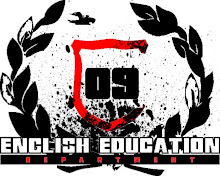- Rina Hernawati (1209204104) - Rosi Handayani (1209204110)
- Rina Khairunnisa (1209204105) - Ulfa Nuraeni (1209204133)
- Risa Nurul Syahbani (1209204107)
Dyslexia as a Barrier for Children Language Acquisition
Are your children really poor when they are reading or writing? Be cautious he/she maybe suffers dyslexia. Dyslexia is a syndrome caused by brain disorder particularly in left part of neurological language (Understanding Dyslexia, 2009). It was identified first by Oswald Berkhan in 1881 and term dyslexia began to be used in 1889 by Rudolf Berlin. Dyslexia is considered as a specific learning disability that affect directly to the ability of literacy such as reading and writing skill. However, dyslexia is not caused by intelligence factor rather than brain injury. It does not mean that dyslexics are stupid or they have low intelligence instead of having problem in their brain. It is proven that there are some famous scientists such as Albert Einstein and Thomas Edison had ever suffered dyslexia. Concerning it, dyslexia can block children language acquisition as a basic of other knowledge acquisition if it is not treated.
Dyslexia usually impact to writing and reading skill. Dyslexics are really poor of reading ability than others who are normal. They will not be able to decode or read some reading stuffs associating with sound and letter. Consequently they will be poor when some words are dictated, because they can’t associate sounds and dictated words. This is called as phonic disability. They particularly tend to be hard to hear some words that have similar sounds. For instance, they will be difficult to distinguish between words” fast” and “feast”. In addition, dyslexia also can impact to writing disability. It overlaps with spelling disability. This is likely to be caused by visual distraction. They frequently are not able to decode some letters, especially the words that have similar formation. For examples, when they are copying the letter such as “d”, they will write “b”. Another, they will write “S” for numerical letter “2” or “9” becomes “6”.
Alluding to this occurrence, some experts said that those are caused by visual distraction. When they are copying some words, their visual tend to dominate in the right eye—there is no balance between left and right sight. Their brain cannot associate the information retrieved from both of eye sights, so they always write or read miss word, e.g. they will spell word “enough” becomes “enuf”. (Learning, 2010)
Regarding to those symptoms, dyslexia will be severe problem for children development if it is not cured seriously. It needs a good cooperation among peoples around dyslexic’s environment, i.e. parents, teacher and society. However, in fact, it is undeniable that there are many parents and teachers who neglect dyslexics because of lacking of knowledge about dyslexia. They, instead, tend to judge them as a dumb, pool, or lazy children. If it remains unrealized by parents or teachers, it will cause complex learning disability even possibly will cause life disability. In term that it will cause another learning disability besides writing or reading skill. For example, when dyslexics intensely are underestimated, they will be a stolid one and sometime they will be obstinate one. They will predispose to their social life—they will not be able to interact well in their social life. Those are caused by pressures from parent or teachers.
Besides parent and teacher, society also has the important role in dyslexic life. Sometime, societies who do not understand about dyslexia incline to discriminate them. For instance, when they are playing with their friends, i.e. normal friends, they are frequently underestimated and neglected by their friends. If it remains unsolved, dyslexics will get worse.
However, dyslectics should not be abandoned but it should really paid attention by teachers, parents and society. There are some ways how to cope with dyslexics.
Firstly, parents should be positive thinking toward their children. They should not judge their children as a stupid, naughty or lazy child, but they have to add their knowledge about learning disability, especially about dyslexia. When they find that their children are dyslexics, they should encourage them such as by giving praise and gifts, so they will be motivated. (Farida, 2008)
Secondly, teachers also should not despise their students who are dyslexics. They should treat their students wisely and they have to be patient in overcoming dyslexics. Teaching dyslexics need a specific method, such as phonic method. Teacher should not abandon phonic because dyslexics usually have serious problem with associating sound and visual. Hence, keep practicing of phonic is really recommended. (Teacher’s Guide, 2011)
The last is society also should pay attention toward dyslexics. They have to support the families who have dyslexics. In term that they should not discriminate them, instead they have to encourage them.
It can be concluded that dyslexia will indeed be a serious problem if it is not healed. It will block their language skill, so it should not be considered trivially because language is a basic skill that everyone must have for getting other skills. Dyslexics will undergo life disability if they are not assisted seriously to get language acquisition. Thus, dyslexics really need to be paid attention by everyone, particularly by parents, teacher and society.
References
Anonymous. 2009. The Facts about Dyslexia. http://www.pbs.org/parents/readinglanguage/articles/dyslexia/the_facts.html. (Accessed at 7th of March 2012)
Anonymous. 2011. Teacher's Guide.http://www.iamdyslexic.com/teachersguide.htm (Accessed at 7th of March 2012)
Anonymous. 2010. Learning. http://www.optimumlearningandhealth.com/Transaction/frmCMS.aspx?T=3&ST=1 (Accessed at, 27th of February 2012)
Anonymous. 2010. Dyslexia. http://en.wikipedia.org/wiki/Dyslexia. (Accessed at 27th of February 2012)
Anonymous. 2012. List of people diagnosed with dyslexia. http://en.wikipedia.org/wiki/List_of_people_diagnosed_with_dyslexia. (Accessed at (Accessed at 27th 2012)
- Anonymous. 2009. Understanding Dyslexia. http://www.inclusion-boltondata.org.uk/PdfData/Data%2019.pdf (. (Accessed at 7th of March 2012)
- Farida. 2008. Kiat Mengatasi Problem Disleksia. http://mommygadget.com/2008/08/14/kiat-mengatasi-problem-disleksia/ (Accessed at 27th 2012)









0 komentar:
Posting Komentar